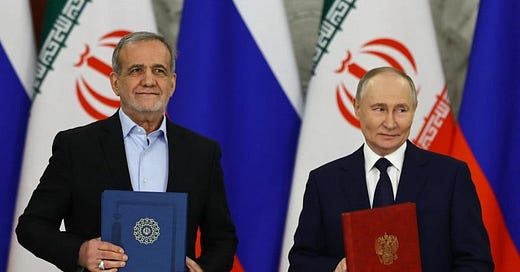In Classic Soviet Speak: «On the Treaty of Comprehensive Strategic Partnership Between the Russian Federation and the Islamic Republic of Iran»
CONTRACTING PARTIES SHALL… | NORTH-SOUTH CORRIDOR, ENERGY & WESTERN SANCTIONS
Dear BWR Shoeshiners and Barbers!
IMPORTANT NOTICE: Please be aware that some e-mail servers (G-mail in particular) may truncate the BWR newsletter, thus depriving you of total enjoyment. If this prob…
Keep reading with a 7-day free trial
Subscribe to Barbershop Whispers....Russia (Adam A Blanco) to keep reading this post and get 7 days of free access to the full post archives.



